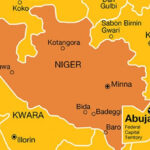
The President, Major General Muhammadu Buhari (retd.), on Wednesday, told world leaders that his regime is committed to entrenching a process of free, fair, transparent and credible elections that would, among other things, usher in a new president next year.
This was as he assured the global community of Nigeria’s compliance with constitutional term limits, adding that “a new face” would represent the country at the next United Nations General Assembly.
Buhari made these comments during his last address as president at the 77th session of the UNGA in New York, USA.
He said, “We believe in the sanctity of constitutional term limits and we have steadfastly adhered to it in Nigeria.
“We have seen the corrosive impact on values when leaders elsewhere seek to change the rules to stay on in power. Indeed, we are now preparing for the general elections next February.
“At the 78th UNGA, there will be a new face at this podium speaking for Nigeria.”
While thanking Nigeria’s international partners for their support of her electoral institutions, Buhari noted that his regime had “invested heavily” to strengthen the country’s framework for free and fair elections.
“As President, I have set the goal that one of the enduring legacies I would like to leave is to entrench a process of free, fair and transparent and credible elections through which Nigerians elect leaders of their choice,” he noted.
The President also called for debt cancellation for developing countries facing severe fiscal and liquidity challenges.
According to him, the challenges facing most developing countries had placed a “debilitating chokehold on their fiscal space,” justifying the need to address the burden of unsustainable external debt by a global commitment to the expansion and extension of the Debt Service Suspension Initiative as well as outright cancellation.
On the war in Ukraine, he warned that the danger of escalation further justifies Nigeria’s resolute calls for a nuclear-free world and a universal Arms Trade Treaty, which are necessary measures to prevent global human disasters.
He demanded that world leaders must find quick means to reach a consensus on the nuclear non-proliferation treaty with related commitments by nuclear weapon states.
He said the war would have adverse consequences on all, hindering the capacity of the international community to work together to resolve conflicts elsewhere, especially in Africa, the Middle East and Asia.
On climate change, Buhari expressed concern that Africa and other developing nations, which produce only a small proportion of greenhouse gas emissions, compared to industrial economies, are the hardest hit by its consequences as seen in the sustained droughts in Somalia and floods of unprecedented severity in Pakistan.





